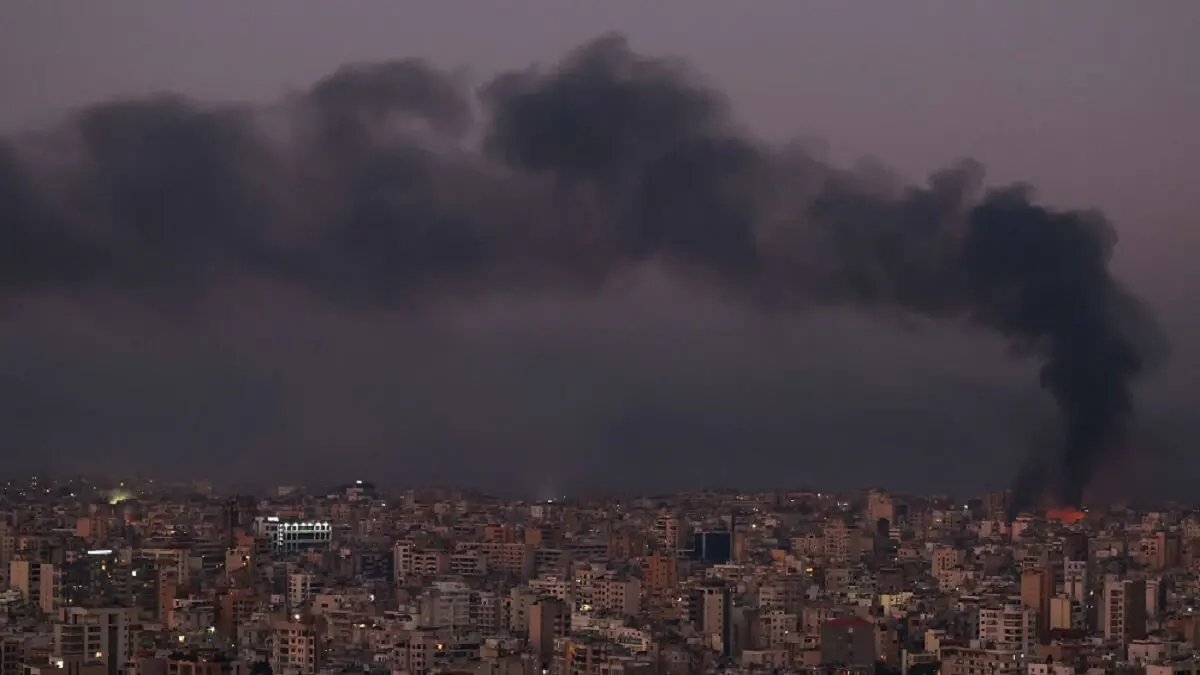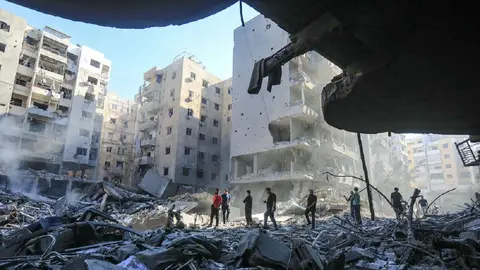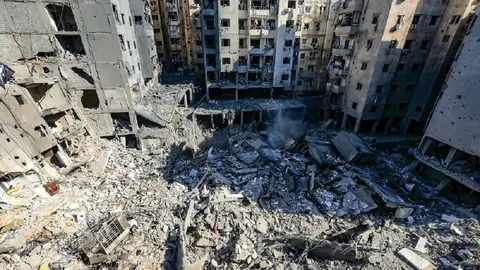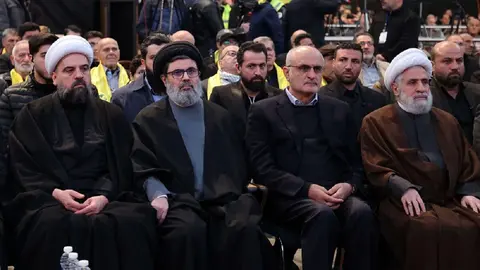Scenarios for a crossroads

Lucas Martin
Once again this week, we are assessing events that are all too recent. But while it is true that this is not the norm, it is also true that it is not often that we witness situations as transcendental as the one we are experiencing
What happened last Friday only confirms what we have been saying in this space and in the programme ‘De cara al mundo’ practically since 8 October last year: ‘Israel's reaction will not stop in the war against Hamas. Israel will never again allow anything like what happened on 7 October to happen again, and that necessarily means taking Hezbollah out of the equation as well, which it will do when it feels the time is right‘.
And if one thing has become clear, it is that the all-out war against Hizbollah has already begun, and with it the confirmation of our assertions. To be honest, however, we have to say that in a format and following a strategy that absolutely no one could have imagined.
The beginning of this operation can be traced back to the moment when the order was given to activate the process that led to the explosion of all the beepers. As we noted last week, this first phase was aimed not only at eliminating as many mid- and high-level commanders as possible, but also at provoking panic in such a way as to lead the organisation to use alternative means of communication and not to take all appropriate security measures by conducting communications in the clear.
In doing so, Israeli intelligence elements would gain valuable information on as yet unidentified elements, locations, command structure and new communication systems to track, tap into and obtain more information from. And all with a single purpose: to be able to eliminate the entire command structure of the organisation, so that either it would be so degraded that the final objective could be considered achieved or, if necessary, if the operation had to be finished off with a ground intervention in Lebanon, that this would be at the cost of the least possible number of own casualties.
Israel has almost completely overturned the command and control system of the Shiite militia, eliminating the entire leadership and a large number of middle-level cadres. As a result, the units do not know what strategy to follow, what they should do and, at the same time, within a large number of these units there is no clear leader who can take the initiative at any given moment.
The consequence is more chaos and more mistakes. All of the above, coupled with the certainty that Israel's intelligence penetration of Hizbollah is enormous, is allowing one after another of the organisation's most important weapons caches to be destroyed. The reason is clear. This is the greatest threat to Israeli civilians and the main response tool that Hizbollah had at its disposal. Israel is making sure that its actions are unanswered by the pro-Iranian militia and that its population is not affected by retaliation. No one can doubt that this operation has been months in the planning and has been thought out to the last millimetre.
The big question at the moment is ‘what now?’ ‘How will Israel's actions affect the region?’ And these questions are obviously being asked with an eye on Iran.
The fear that this will mean a full-scale war across the region is still present, but, diminishing by the day in the light of events. This would be the most dangerous, but at the same time the least likely scenario. If it were to materialise, it would entail a forceful response from Iran, which would be seconded by the Shia militias of Iraq and Yemen (Houthis), forcing Israel to strike back in a spiral that could set the whole region on fire, forcing Tel Aviv to rethink the ground operation in Lebanon and become embroiled in a long, bloody confrontation with an uncertain outcome.
But there are elements that lead us, not to rule out this possibility, but to reduce its likelihood. On the one hand, neither the militias in Iraq nor the Houthis have the capacity to carry out large-scale attacks, so their effectiveness would be very limited. On the other hand, Iran has long threatened a response against Israel, yet has done absolutely nothing. The beeper operation has spread fear within the Tehran regime, and after the attack on Israel a few months ago it became clear that the cost of a ‘shooting war’ between Iran and Israel would be much higher for the former and that the intended support from the Muslim world would not be forthcoming.
But there is more. This time even the Tehran regime's rhetoric has not been as vehement as on previous occasions. Not even when it became known that a prominent member of the Quds force was standing next to Nasrralah at the time of the attack and suffered the same fate.
All these indicators point to a scenario in which the feared Iranian response will not be forthcoming. At least not in the form of a direct attack on Israel. In short, for the following reasons:
- The fear of having suffered an infiltration similar to that suffered by Hezbollah that would trigger a similar attack.
- The lack of capacity of the remaining militias.
- Lack of support in the Islamic world.
- Israel's demonstrated capability in a salvo-based confrontation.
But there is yet another factor to be added: the reaction of the Lebanese people. Just as we saw how in Gaza part of the population did not exactly show support for Hamas at the beginning of Israel's attacks, in Lebanon groups of citizens have even clashed with Hezbollah militants when the latter were demonstrating.
We may be witnessing one of the most important developments that can take place in the region: that the Palestinian and Lebanese populations themselves become aware of the burden of unpunished Iranian militias manipulating their respective causes and problems in Iran's favour without the slightest concern for them, and see them as a brake on their progress and development.
But then, what is the other scenario that opens up and seems to be the most likely?
First, we must return to Iran's reaction, or rather ‘non-reaction’. The Persian country is aware of the isolation that the signing of the Abraham Accords meant for them, let alone the impact on support for the Palestinian cause.
Since then, its foreign policy, which until then had worked for it based on the action of its militias and stirring up the Palestinian problem, has been limited. Countries such as Saudi Arabia, the United States and Israel lost their fear of striking Iranian interests in one way or another without Tehran being able to respond beyond actions aimed more at domestic consumption. At the same time, however, a certain misunderstanding between Iran and its militias began to emerge. The militias began to act somewhat on their own and there was a sense that the Quds force had lost some of its control over them.
The culmination of this situation was the heinous attack of 7 October, of which Iran appears to have been unaware or at least unaware of the scale of what was planned. All of the above may lead us to consider the possibility that the change in the leadership of Hamas and Hezbollah, as well as the reconstruction of these militias, is not something that displeases the Iranian supreme leader, as it may be the best way to regain full control of them, especially considering that now more than ever they are going to need the support of their supreme leader.
This may also open up the possibility of Iran seeking external action that is less based on the use of its militias and more focused on other types of relations, which are much needed to lift Iran's degraded economic fabric.
But a very interesting factor in this new scenario that may arise is that, while the Abraham Accords isolated and limited support for the Palestinian cause, especially from the Islamic world, a new situation without pressure from Hamas and Hezbollah may mean the involvement of those same countries in the reconstruction of Gaza, southern Lebanon, and the search for options that will truly help both territories to emerge from the terrible situation they have experienced so far.
And this is probably the most critical and important factor of all. Now that everything points to the fact that the oppressive yoke of these terrorist militias will not have the necessary power over Palestinians and Lebanese, if they do not perceive that they are listened to, supported and taken into account, if they see that everything will remain the same, we can be sure that a new generation of tougher and more radicalised terrorists will take the place of those who have now fallen. And the problem, far from being solved, will only get worse.
A scenario in which Lebanon's development is encouraged and promoted and the reconstruction of the Palestinian territories is supported, as well as the establishment of an economic fabric that helps its inhabitants to prosper, all under the auspices of the Muslim signatories to the Abraham Accords, would be the key to bringing stability to the entire region by reinforcing the Accords themselves. In addition, it would leave Iran as the real discordant element in the region, without forgetting Syria, which could take over as the source of problems in the region, but this time without the strength of its militias, which would force it to look for more conventional and less traumatic ways of exercising its external action.
We have just sketched the most utopian form of what we consider to be the most likely scenario, the basis of which is the absence of a harsh and angry response from Iran. However, one key point should not be forgotten: Israel must understand the situation and not only try to be as restrained as circumstances allow in order to achieve its objectives, but facilitate the subsequent actions we have mentioned. Otherwise everything will again become totally unpredictable.




